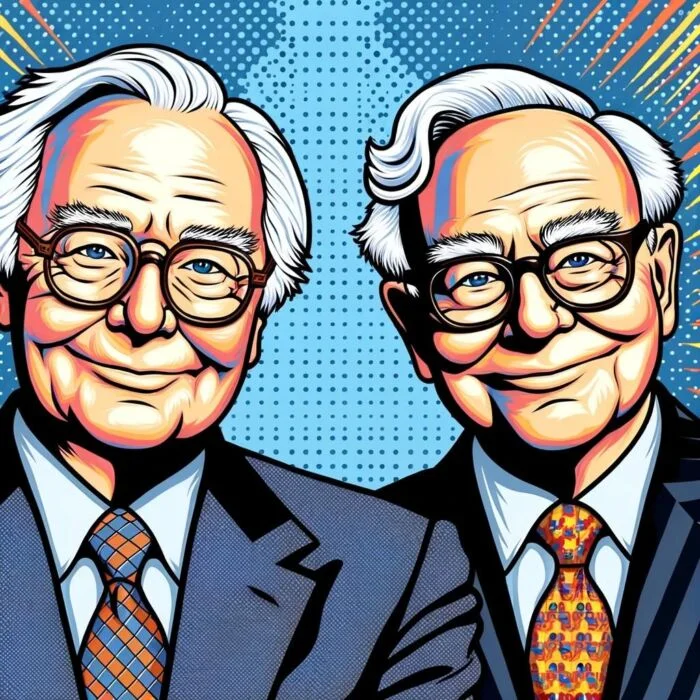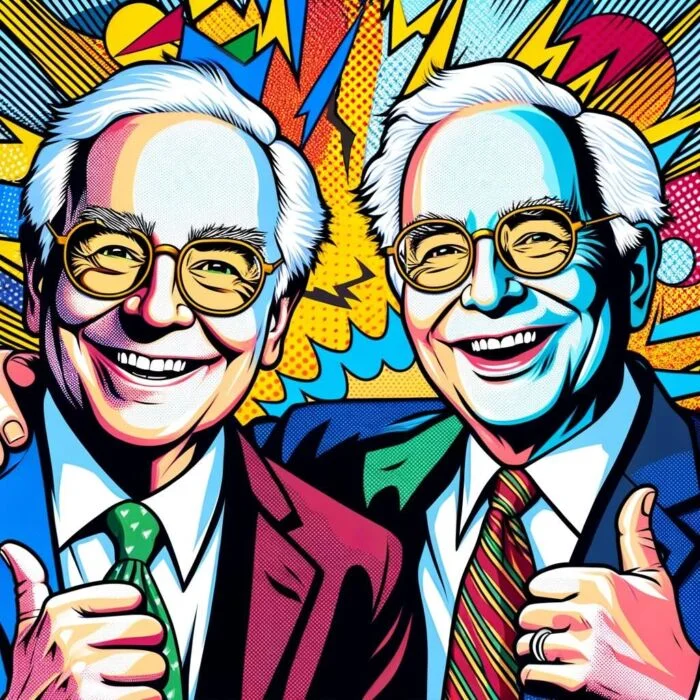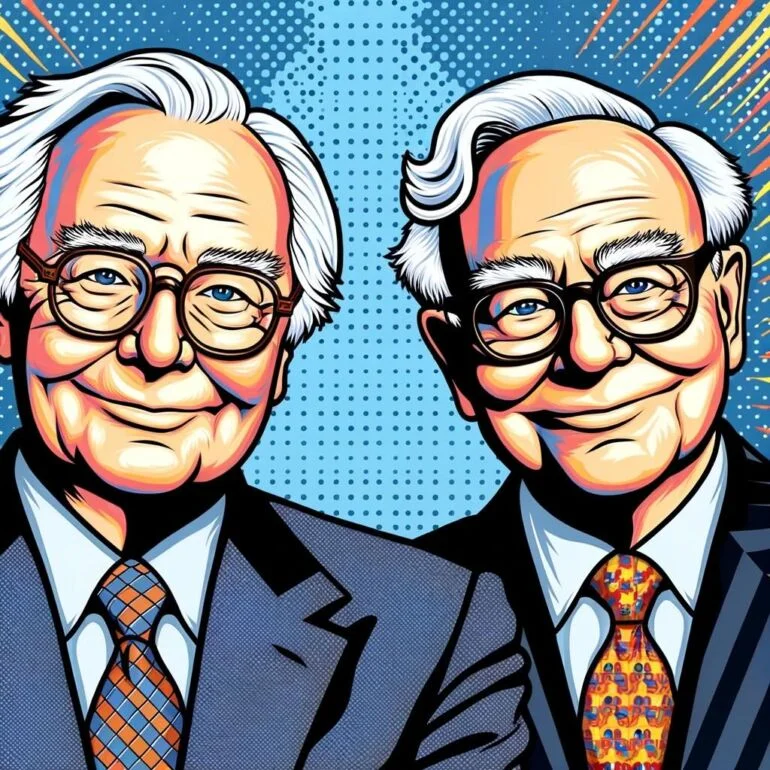In the world of finance, Warren Buffett and Charlie Munger are names that echo with reverence. Warren Buffett, fondly known as the “Oracle of Omaha,” is a titan of investing, famous for his prescient and disciplined approach to buying stocks. His humility and folksy wisdom, coupled with his remarkable track record, have made him a guiding light for investors around the world.
Charlie Munger, on the other hand, may not be as widely recognized, but his influence is no less potent. An intellectual powerhouse, Munger is Buffett’s right-hand man and vice chairman of Berkshire Hathaway, their mutual business venture. His razor-sharp insight and penchant for multi-disciplinary thinking have significantly shaped their joint investment strategy.
Their Partnership and Its Impact on Berkshire Hathaway
When Buffett and Munger joined forces at Berkshire Hathaway, it was like capturing lightning in a bottle. Their unique but complementary investment styles – Buffett’s patient, value-focused approach and Munger’s wide-ranging intellectual curiosity – transformed a struggling textile mill into a multi-billion-dollar conglomerate. Together, they’ve demonstrated that friendship and business can indeed mix, creating a partnership that’s not just profitable, but also enduring.

Buffett’s and Munger’s Partnership
In this article, we’ll delve into the heart of Buffett and Munger’s partnership, exploring how two individuals with distinct styles harmoniously built an investment empire. We’ll dissect their shared philosophy, examine their influence on Berkshire Hathaway, and share some pearls of wisdom they’ve gifted to the investing community. We’ll also delve into their succession planning efforts and what the future might hold for Berkshire Hathaway. Throughout this exploration, we aim to uncover what makes this dynamic duo a force to reckon with in the world of investing.
The Formative Years and the Birth of a Partnership

Buffett’s Early Investment Career and Formation of Berkshire Hathaway
Warren Buffett was born with a knack for numbers and a penchant for business. He bought his first stock at the age of 11, and by the time he was 15, he owned a small business delivering newspapers. After learning under the mentorship of Benjamin Graham, the father of value investing, Buffett launched his investment career. His firm, Buffett Partnership Ltd., generated impressive returns, and by the mid-1960s, he took control of Berkshire Hathaway, a struggling New England textile company. Little did the world know that this would become the epicenter of a financial empire.

Munger’s Background, His Own Investment Philosophy, and How He Met Buffett
Charlie Munger, a lawyer by training and a philosopher at heart, had a somewhat unconventional entry into the world of investing. He was deeply influenced by the “latticework of mental models” concept, which advocates understanding a wide range of disciplines to make better decisions. Munger’s investment philosophy, centered around patience, discipline, and the refusal to follow the crowd, resonated strongly with Buffett’s approach. Their paths first crossed at a dinner party in Omaha, where they found a shared disdain for the prevalent short-term investment mentality. A friendship sparked, and a formidable partnership was on the horizon.

The Synergy Between Their Investment Philosophies Leading to Their Partnership
While Buffett and Munger had distinct perspectives, they found a shared conviction in the philosophy of buying quality businesses at a fair price and holding them for the long haul. They believed in investing in companies they understood and could value reasonably, a concept that became the cornerstone of their partnership. Buffett’s discipline and focus dovetailed with Munger’s intellectual depth and breadth, creating a potent mix that supercharged Berkshire Hathaway’s growth. The partnership wasn’t just about capital growth; it was a shared journey of intellectual discovery, steadfast integrity, and a commitment to long-term value creation.
source: Investor Archive on YouTube
The Philosophy of Buffett and Munger’s Investment Strategy

Their Shared Approach to Value Investing
At the heart of Buffett and Munger’s investment approach is the practice of value investing – the art and science of buying stocks for less than their intrinsic value. They firmly believe in the principle of “buying a dollar for fifty cents,” identifying undervalued companies that the market has overlooked. But their approach transcends mere number crunching. They focus on businesses with durable competitive advantages, excellent management, and the capacity to generate steady cash flow over the long term. This combination of quantitative analysis and qualitative judgement is the cornerstone of their shared investment philosophy.

“Munger’s Latticework of Mental Models” and Its Role in Their Strategy
Charlie Munger’s “Latticework of Mental Models” is a mental toolkit that promotes drawing insights from a multitude of disciplines like psychology, history, economics, and physics, among others. According to Munger, you can’t make a lot of smart decisions without having a broad understanding of the world. This wide-lens perspective informs their investment approach. When evaluating a business, they not only look at financial metrics, but also consider factors like industry dynamics, geopolitical influences, management ethos, and societal trends. This broad, interdisciplinary approach gives them a more nuanced understanding of potential investments and the various forces that might affect their value.

Their Belief in the Power of “Compound Interest”
Buffett and Munger are ardent believers in the power of compound interest, often touted as the “eighth wonder of the world.” They understand that wealth creation is a marathon, not a sprint, and the real magic happens when returns on an investment are reinvested, leading to exponentially increasing profits over time. This principle guides their “buy and hold” strategy. They’re not swayed by market trends or short-term fluctuations; they focus on owning pieces of businesses for an extended period and allowing the compounding effect to do its work. In their view, time is the friend of the wonderful business, the enemy of the mediocre.

The Influence of Their Partnership on Berkshire Hathaway
Case Studies of Joint Investment Decisions and Their Outcomes
One of the most legendary investments of Buffett and Munger is Coca-Cola. After the market crash in 1987, they saw an opportunity in Coca-Cola’s undervalued stock. They believed in the brand’s enduring appeal and the company’s ability to generate cash flow. Their decision paid off tremendously as Coca-Cola’s value soared in the following years.
Another defining investment was See’s Candies, which marked a shift in their investment philosophy. When Buffett and Munger bought See’s Candies in 1972, it wasn’t cheap, but it had a strong brand, loyal customer base, and pricing power. The consistent, strong cash flow from See’s helped fund investments in other companies, and it was a potent reminder of the value of quality over price.

The Evolution of Berkshire Hathaway Under Their Stewardship
Under Buffett and Munger’s stewardship, Berkshire Hathaway has evolved from a struggling textile company into a global conglomerate. Today, its portfolio spans a wide range of industries, including insurance, utilities, railroads, and manufacturing, to name a few, and includes stake in world-renowned companies like Apple, Amazon, and Bank of America. Their long-term, value-focused investment strategy has driven impressive growth and delivered substantial value to shareholders.
Insights into Their Annual Shareholders’ Letters and Meetings
Dubbed the “Woodstock for Capitalists,” Berkshire Hathaway’s annual meetings provide fascinating insights into Buffett and Munger’s investment philosophy, wit, and wisdom. Similarly, their annual shareholders’ letters, penned by Buffett, are more than just corporate updates; they’re full of timeless investment wisdom, self-deprecating humor, and a unique blend of simplicity and profound insight. These letters and meetings showcase their unwavering commitment to transparency, integrity, and shareholder communication, further cementing their status as legends in the investing world.
source: The Financial Review on YouTube
The Wisdom of Buffett and Munger: Key Lessons and Quotes

Compilation of Their Wisdom on Investment, Risk Management, and Corporate Governance
Buffett and Munger’s philosophy is a treasure trove of wisdom. Their views on investing, encapsulated in quotes like Buffett’s “Price is what you pay; value is what you get,” and Munger’s “It is remarkable how much long-term advantage people like us have gotten by trying to be consistently not stupid, instead of trying to be very intelligent,” offer deep insights into their value-based approach.
On risk management, Buffett’s famous caution “Do not test the depth of the river with both feet” perfectly illustrates their emphasis on careful due diligence. Munger’s insistence, “All I want to know is where I’m going to die, so I’ll never go there,” speaks volumes about avoiding potential pitfalls.
When it comes to corporate governance, their insistence on “owner-related business principles” reflects their belief in transparency, accountability, and treating shareholders as partners.

Exploration of Their Views on Ethics and Responsibility in Business
Both Buffett and Munger hold strong views on ethical conduct in business. Buffett’s assertion that “It takes 20 years to build a reputation and five minutes to ruin it. If you think about that, you’ll do things differently,” shows the importance they place on integrity. Munger’s wisdom shines through in his statement, “You don’t have a lot of envy, you don’t have a lot of resentment, you don’t overspend your income, you stay cheerful in spite of your troubles. You deal with reliable people and, most importantly, you’re reliable yourself. There are huge advantages in life to these behaviors.”
Their Advice to Young Investors and Future Business Leaders
To young investors, Buffett often advises investing in yourself first. His famous advice, “The best investment you can make is an investment in yourself…The more you learn, the more you’ll earn,” resonates deeply. Munger, meanwhile, advises, “Spend each day trying to be a little wiser than you were when you woke up. Discharge your duties faithfully and well.”
For future business leaders, their philosophy is clear: Build a business that you’d never want to sell. Buffett once remarked, “I try to buy stock in businesses that are so wonderful that an idiot can run them because sooner or later, one will.” This advice points future leaders to the importance of building robust systems, not just momentary successes.
source: YAPSS on YouTube
Succession Planning and the Future of Berkshire Hathaway
Succession planning has been a topic of ongoing discussion for Berkshire Hathaway, given the advancing age of both Buffett and Munger. Both have consistently emphasized that the company’s robust culture and operational model will ensure its continuity beyond their tenure. They’ve also reassured shareholders that potential successors have been identified and are ready to step in when necessary.

Potential Successors and the Future Direction of the Company
While Buffett and Munger have not publicly named a successor, they have built a strong bench of executives within the company. Speculations often point to Greg Abel, who runs all non-insurance operations, and Ajit Jain, who oversees the insurance businesses, as potential successors. Both have demonstrated exceptional leadership and a deep understanding of Berkshire’s operations. While nobody can predict with certainty the future direction of the company post-Buffett and Munger, the strong foundations they’ve laid provide confidence in the company’s enduring prosperity.

Their Lasting Legacy in the World of Investment
The legacy that Warren Buffett and Charlie Munger leave behind transcends their extraordinary investment returns. They have reshaped how people perceive investing, emphasizing long-term value creation over short-term gains. Their teachings, spanning topics from risk management to corporate governance, and their unwavering commitment to ethical business conduct have left an indelible mark on the investing world. Their impact will continue to be felt through the principles they’ve championed, the company they’ve built, and the future leaders they’ve influenced. This legacy is an integral part of the investment landscape and will continue to inspire and guide investors for generations to come.
source: YAPSS on YouTube
Conclusion: Buffett and Munger’s Investment Approach

The approach that Buffett and Munger have followed throughout their careers is not just an investment strategy; it’s a philosophy of life. It encompasses key principles such as the enduring power of value investing, the importance of a broad understanding to make sound investment decisions, the magic of compounding, and the insistence on ethical conduct and transparency in business. This duo’s philosophy is a testament to the notion that investing is as much about character and discipline as it is about financial acumen.
Relevance of Their Strategy in Today’s Rapidly Changing Investment Landscape
In the face of rapidly evolving technology, shifting economic landscapes, and the rise of new investment trends like cryptocurrencies and meme stocks, the classic approach of Buffett and Munger remains relevant. Their focus on fundamental analysis, intrinsic value, and long-term thinking serves as a counterpoint to the frenetic pace of today’s financial markets. While new investment vehicles and strategies offer opportunities, the timeless wisdom of this investing duo continues to provide a steady compass for navigating uncertainty and complexity.

Duo’s Enduring Impact on the World of Finance and Beyond
As we look back at the investment journey of Buffett and Munger, it’s clear that their influence extends far beyond the confines of Berkshire Hathaway or even the broader realm of finance. Their wisdom has permeated business schools, boardrooms, and living rooms around the globe. They’ve taught us that investing isn’t merely about making money; it’s about understanding businesses, people, and indeed, the world. Their legacy is one of intellectual curiosity, steadfast integrity, and profound wisdom. And it’s a legacy that, much like the fruits of their ‘buy and hold’ strategy, will keep on giving for many generations to come.
Important Information
Investment Disclaimer: The content provided here is for informational purposes only and does not constitute financial, investment, tax or professional advice. Investments carry risks and are not guaranteed; errors in data may occur. Past performance, including backtest results, does not guarantee future outcomes. Please note that indexes are benchmarks and not directly investable. All examples are purely hypothetical. Do your own due diligence. You should conduct your own research and consult a professional advisor before making investment decisions.
“Picture Perfect Portfolios” does not endorse or guarantee the accuracy of the information in this post and is not responsible for any financial losses or damages incurred from relying on this information. Investing involves the risk of loss and is not suitable for all investors. When it comes to capital efficiency, using leverage (or leveraged products) in investing amplifies both potential gains and losses, making it possible to lose more than your initial investment. It involves higher risk and costs, including possible margin calls and interest expenses, which can adversely affect your financial condition. The views and opinions expressed in this post are solely those of the author and do not necessarily reflect the official policy or position of anyone else. You can read my complete disclaimer here.






